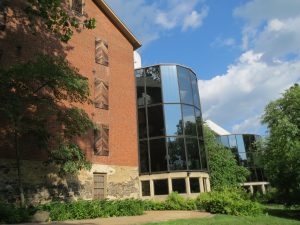No matter how passionate you are about nature, sitting on your laurels is not recommended.
That was one of the messages delivered during a presentation at the Brandywine Conservancy and Museum of Art on Thursday night attended by more than 50 representatives of municipalities and conservation agencies.
Entitled “The State of Pennsylvania’s Environmental Affairs,” the program featured two speakers: John Theilacker, who manages the conservancy’s Municipal Assistance Program, and Cindy Dunn, the president and CEO of PennFuture, an environmental advocacy agency.

Theilacker began by providing highlights of the conservancy’s accomplishments this year, including the Brandywine Creek Greenway Strategic Action Plan, a conservation planning initiative covering 36,000 acres of protected open space along the east and west banks of the Brandywine. The project has expanded from 17 to 24 municipalities and is now involving Eagle Scouts, who are building educational kiosks along the corridor.
With funding from the William Penn Foundation, the conservancy partnered with the Pennsylvania Land Trust Association (PALTA) to craft a Model Riparian Buffer Protection Ordinance, which is being pursued to date by 10 municipalities. The conservancy also extended its geography beyond the Brandywine-Christina Watershed, working on a water quality project in the Chesapeake Bay.
A reforestation initiative for the Brandywine Watershed sought the planting of 25,000 trees by the end of 2014 – an objective met in April. “And so we didn’t sit on our laurels, we gave ourself a new goal: 50,000 by the fall of 2017,” Theilacker said. That date will also mark the Brandywine Conservancy’s 50th anniversary.
Theilacker said the conservancy was excited to partner with the Borough of West Chester, Natural Lands Trust, the county commissioners, and a citizens’ group to save the Barclay Grounds, an urban parcel at the intersection of North High and West Marshall Streets. It was also enthused about working on Walkable Chadds Ford – “right here in River City.” He said one of the benefits would be enabling pedestrians to get from Leader’s Sunoco to Hank’s restaurant without getting run over.”
The year’s success stories could not have occurred without the support of municipalities and funders, many of whom were in the audience, Theilacker said before turning the podium over to Dunn.
Tasked with discussing environmental issues that will be important under the Wolf administration, Dunn suggested that the November election brought good news as well as bad.
Dunn said Gov. Tom Wolf has not only appeared more responsive to environmental concerns, but he has also reinforced those views through key appointments. Katie McGinty, Wolf’s chief of staff, is a former rival of Wolf’s for governor who worked in the office of then-U.S. Sen. Al Gore and as secretary of the state Department of Environmental Protection (DEP) under Gov. Ed Rendell.
John Hanger, Wolf’s secretary of planning and policy, is a former president of PennFuture, which was created by the Pew Charitable Trusts and the Heinz Endowments in 1998 to conduct professional advocacy for strong environmental and public health policies. Hanger also served as secretary of Pennsylvania’s DEP and as commissioner of the state’s Public Utility Commission.
Despite a governor’s office with environmental inclinations, the shift in the legislature to a stronger Republican majority will make it difficult for Wolf to act upon them, Dunn said. She said many of the lawmakers who won do not have established environmental records.
Dunn cited state Sen. Dominic Pileggi, state Sen. Andy Dinniman, and state Rep. Chris Ross as local lawmakers who could be counted on to protect the environment. She lamented Pileggi’s recent ouster as majority leader by state Sen. Jake Corman, a Republican who had chaired the Appropriations Committee. “He’s not Pileggi when it comes to all things environmental,” Dunn said.
Although many Republicans share Wolf’s support for an extraction tax on natural-gas drilling, Dunn said she doesn’t believe it will happen easily. “Wolf will inherit a brutal budget,” she said, suggesting that such a tax will be key to closing the budget gap. “It’ll still be a big fight.”
Another area of concern is storm water, which Dunn called “the fastest-growing segment of water pollution,” thanks to fertilizers, yard waste, and other contaminants. “We all have to pick up our game,” she said.
Dunn said one of the few environmental laws that passed during the Corbett administration allows municipalities to set up storm-water authorities with the ability to assess fees, which can then be used for remediation. “This is definitely the area that will pioneer this,” she said, referring to southeastern Pennsylvania.
Other issues likely to cause problems include controlling methane leakage from fracking and regulating pipelines.
Emphasizing that local pressure will make a difference, Dunn said, “I’d encourage everyone to get involved ... We certainly need your voice. Environmental work is never done.”
After the presentation, Alma Forsyth, a member of the Pennsbury Land Trust and the League of Women Voters, said she hoped Dunn’s message of engagement would resonate. “All municipalities need to study their ordinances,” she said. “They need to realize it makes a difference in protecting their community.”

 (5 votes, average: 4.60 out of 5)
(5 votes, average: 4.60 out of 5)

Comments